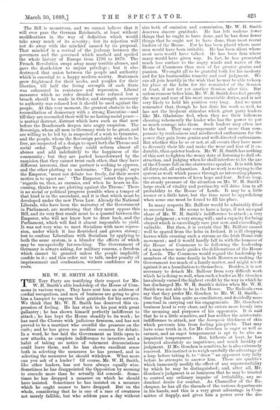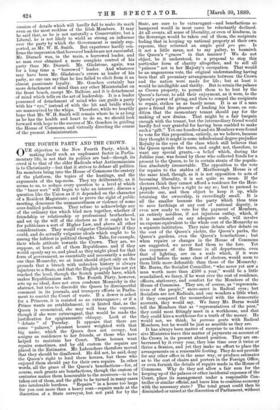MR. W. H. SMITH AS LEADER. T HE Tory Party are
testifying their respect for Mr. W. H. Smith's able leadership of the House of Com- mons in various ways. They have sent him an address of cordial recognition, and men of business are going to give him a banquet to express their gratitude for his services. We think that Mr. W. H. Smith has deserved this ex- pression of feeling. He has stuck to his post with great gallantry ; he has shown himself perfectly indifferent to attack ; he has kept the House steadily to its work ; he has used the Closure with judicious firmness, and has not proved to be a martinet who overdid the pressure on the curb ; and he has given no needless occasion for debate. In a word, he has laid the Government as little open to new attacks, as complete indifference to invective and a habit of taking no notice of vehement denunciations could leave them, and he has shown excellent sense both in selecting the measures he has pressed, and in selecting the measures he should withdraw. What more can you ask of a leader ? Of course, Mr. W. H. Smith, like other leaders, has not been always equally wise. Sometimes he has disappointed the Opposition by seeming to concede more than he actually did concede. Some- times he has dropped a measure on which he should have insisted. Sometimes he has insisted on a measure which he ought sooner to have dropped. But on the whole, considering that he is one of a race of creatures not merely fallible, but who seldom pass a day without sins both of omission and commission, Mr. W. H. Smith deserves sincere gratitude. He has left undone fewer things that he ought to have done, and he has done fewer things that he ought not to have done, than most recent leaders of the House. For he has been placid where most men would have been irritable. He has been silent where most men would have talked. He has been firm where many would have given way. In fact, he has presented much less surface to the angry winds and waves of the House of Commons than men of far greater genius and passion. We ought all to be grateful both for his modesty and for his businesslike tenacity and cool judgment. We can all join heartily in the wish that he may be able to keep his place at the helm for the remainder of the Session at least, if not for yet another Session after this. But unless rumour belies him, Mr. W. H. Smith does feel greatly the wear and tear of his most unenviable duties, and is not very likely to hold his position very long. And we must remember that, though he has done his work so well, he has not the frequent stimulus which great party leaders like Mr. Gladstone feel, when they see their followers cheering vehemently the leader who has the power to put so much courage into them. Such leaders may often not be the best. They may compensate and more than com- pensate by restlessness and misdirected enthusiasm for the power they gain from genius and well-directed enthusiasm. But whether this be so or not, at all events they have more to diversify their life and make the wear and tear of it en- durable, than quieter leaders. Mr. W. H. Smith has nothing of this sort to lighten the weary duty of listening to dull ob- struction, and judging when he shall interfere to let the axe of the Closure fall on the obstructive speaker. It is with him all duty-toil, all exhaustion. And no work is so trying to the system as work which passes through no interesting phases, no crises, no moments of keen hope and fear. Before long, the steady pressure of the situation on Mr. W. H. Smith's large stock of vitality and pertinacity will drive him in all probability to the House of Lords. It may be a little sooner or a little later, but the time must be apprdaching when some one must be found to fill his place.
In many respects Mr. Balfour would be admirably fitted to succeed him. He seems to have a large, if not an equal share of Mr. W. H. Smith's indifference to attack ; a very clear judgment ; a very strong will ; and a capacity for being obeyed which is exceedingly rare just now, and exceedingly valuable. But then, it is certain that Mr. Balfour cannot well be spared from the helm in Ireland. It is ill chopping horses while crossing such a stream as the Irish Home-rule movement ; and it would hardly fall in with the humour of the House of Commons to be following the leadership of a man whose uncle guides the deliberations of the House of Lords. The Commons would regard the leadership by members of the same family in both Houses as making the Government too much of a family matter, and might revolt against it as a humiliation to themselves. Besides, it is not necessary to detach Mr. Balfour from very difficult work which he is doing so well, when such a leader as Mr. Goschen has already earned the highest credit by the way in which he has discharged Mr. W. H. Smith's duties when Mr. W. H. Smith was not able to be in the House. The Radicals even say that they prefer Mr. Goschen to Mr. W. H. Smith,— that they find him quite as conciliatory, and decidedly more punctual in carrying out his engagements. Mr. Goschen's business head is very clear, and he enters more keenly into the meaning and purposes of his opponents. It is said that he is a little sensitive, and has neither the aristocratic indifference to attack, nor the bourgeois thickness of skin which prevents him from feeling pin-pricks. That may have some truth in it, for Mr. Goschen is eager as well as earnest, and an eager temperament is apt to be also an impatient temperament. But, hitherto at least, he has betrayed absolutely no impatience, and much lucidity of judgment. If Mr. Goschen is sensitive, he is also extremely reserved. His instinct is to weigh carefully the advantage of a leap before taking it, to " draw " an opponent very fully before he attempts to answer him. These are qualities which immensely modify the effect of any supersensibility by which he may be distinguished ; and, after all, Mr: Goschen's judgment is so luminous that he may be trusted to control any ordinary impulse of irritability, any re- dundant desire for combat. As Chancellor of the Ex- chequer, he has all the threads of the various departments in his hands, and this is a very great advantage in Com- mittee of Supply, and gives him a. power over the dis- cussion of details which will hardly fail to make its mark even on the most reckless of the Irish Members. It may be said that, as he is not naturally a Conservative, but a Liberal, he is not likely to wield as strong an influence over the party by which the Government is mainly sup- ported, as Mr. W. H. Smith. But experience hardly con- firms the impression that borrowed leaders are not successful. Mr. Disraeli was, in the main, a borrowed leader, and no man ever obtained a more complete control of his party than Mr. Disraeli. Mr. Gladstone, again, was for a long time a " borrowed " leader. And whatever may have been Mr. Gladstone's errors as leader of his party, no one can say that he has failed to elicit from it an almost passionate loyalty. Mr. Goschen certainly has more detachment of mind than any other Ministerialist on the front bench, except Mr. Balfour, and it is detachment of mind which tells on the art of leadership. It is a leader possessed of detachment of mind who can guide a party with his " eye," instead of with the bit and bridle which are manceuvred by the whips. Therefore, while we heartily hope that Mr. W. H. Smith will remain where he is as long as he has the health and heart to do so, we should look forward with hope to the success of Mr. Goschen in guiding the House of Commons, and virtually directing the course of the present Administration.



















































 Previous page
Previous page